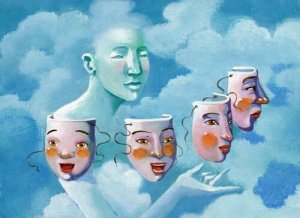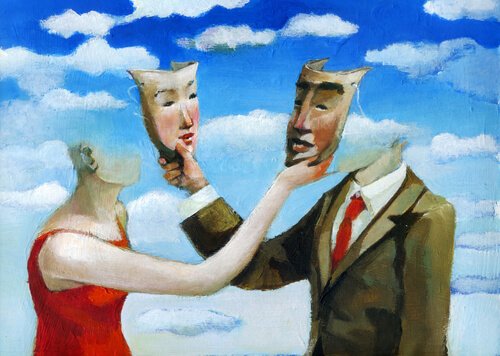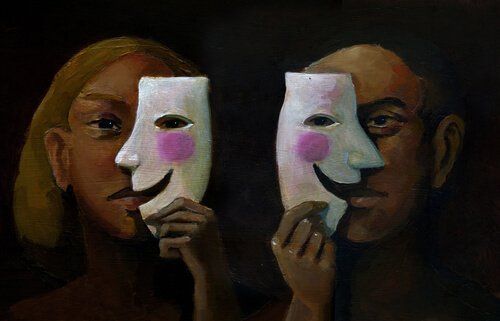Social Dramaturgy: How We Develop Masks to Interact

It’s possible to analyze our interactions with others as if we were in a play. Namely, as if our social life consisted of a series of masquerades. Social dramaturgy is a micro-sociological approach that focuses on the study of human behavior and on the rules that govern our daily interactions.
In Plato’s Symposium, Socrates asks which genre of ancient Greek drama, comedy or tragedy, more closely resembles real life. Socrates argued that it was tragedy. However, it was Erving Goffman, the creator of symbolic interactionism, who said that life was a stage. Goffman argued that in every social interaction we engage in, we consciously or unconsciously try to project a concrete image of ourselves. In other words, we try to manipulate how others perceive us.
For Goffman, our personality isn’t an internal phenomenon. Instead, it’s the sum of all of the different ‘masks’ that we put on throughout our life: a social dramaturgy.
What is social dramaturgy?
Both theatre actors and social actors have the same objective: to be congruent in their interactions with those around them. In order to convey a good impression, we must have dramatic (social) skills and the necessary costumes and props.
However, all of this is irrelevant if the actors on stage can’t agree on the expectations and limitations of their play. In other words, their ‘interpretation’ implicitly indicates how to act in a certain setting (social environment).

The stage and the backstage
There are two important elements in social dramaturgy: the stage and the backstage. In particular, the stage consists of the moments in which we project an image of ourselves for others. On the other hand, the backstage is our private life, which can also be another mask we put on for ourselves.
Social dramaturgy consists of knowing how to move between the stage and the backstage. Additionally, skillfully changing from one set to another and having an appropriate costume at all times are essential requirements for social success. Thus, whoever doesn’t know how to act during the play is a danger to the cast and may be discarded.
While we put on our act, our comments and expressions of surprise, approval, irony, or disgust shape others’ opinions of us. We’re aware of this, which is why we control what we say, ponder our gestures, and monitor our reactions. We’re always acting. Furthermore, we define our roles based on the surroundings we find ourselves in to try to fit in.
We’re always adapting to our role. Just like TV show actors, we may start the first episode with our personality and our job, educational, or relationship situations undefined. We may start changing and defining these aspects once we hear our audience’s reaction. From there, we dedicate our lives to adapt to the character. Or at least until they cancel our show and we have to throw that mask away. For example, we could quit our job, divorce our partner, or graduate from school.
Image and concealment
For Goffman, in this social dramaturgy, people try to present an ideal image every time they interact. This is because we believe it’s beneficial to hide some parts of ourselves:
- We hide the process of rehearsing for our role: We’re like a teacher who, after preparing for a class for hours, gives a lecture pretending to have always understood the subject they’re talking about. In other words, we prefer to show others only the final result of our rehearsal. We don’t show others all of our ‘takes’ or how many times we practiced our lines until we finally memorize them. Those are all ‘behind the scenes’ things.
- We hide all of the dirty work it took to get to where we are. Our character may be incompatible with everything we did to earn praise. For example, imagine a politician who won a political campaign by selling out their integrity. They had to fight tooth and nail to get to the top.
- We hide whatever could keep us from continuing with our act. To do so, we keep criticisms to ourselves. Furthermore, we avoid reacting to insults in a way that could affect the image we’ve chosen to show.

Merchants of morality
As Ervin Goffman said: “In their capacity as performers, individuals will be concerned with maintaining the impression that they are living up to the many standards by which they and their products are judged. Because these standards are so numerous and so pervasive, the individuals who are performers dwell more than we might think in a moral world. But, qua performers, individuals are concerned not with the moral issue of realizing these standards, but with the amoral issue of engineering a convincing impression that these standards are being realized. Our activity, then, is largely concerned with moral matters, but as performers, we do not have a moral concern with them. As performers, we are merchants of morality”. Could it be true?
This text is provided for informational purposes only and does not replace consultation with a professional. If in doubt, consult your specialist.








